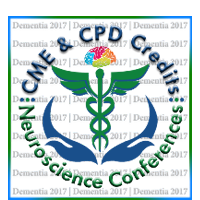Call for Abstract
Scientific Program
9th International Conference on Alzheimer’s Disease & Dementia, will be organized around the theme “ An Insight into Advanced Research and Diagnostic Approaches in Alzheimer’s Disease and Dementia”
Dementia 2017 is comprised of 14 tracks and 141 sessions designed to offer comprehensive sessions that address current issues in Dementia 2017.
Submit your abstract to any of the mentioned tracks. All related abstracts are accepted.
Register now for the conference by choosing an appropriate package suitable to you.
- Track 1-1Alzheimers disease
- Track 1-2Diagnosis of Alzheimer’s Disease
- Track 1-3Treatment of Alzheimer’s Disease
- Track 1-4Stroke-related dementia
- Track 1-5Computational and Mathematical modelling of dementia
- Track 1-6White matter and dementia
- Track 1-7Sleep and dementia
- Track 1-8Young onset dementia
- Track 1-9Multi-infarct dementia
- Track 1-10Mixed dementia
- Track 1-11Subcortical vascular dementia
- Track 1-12Post stroke dementia
- Track 1-13Parkinson dementia
- Track 2-1Vascular dementia prognosis
- Track 2-2Senile dementia
- Track 2-3Senelity
- Track 2-4Cognitive impairment
- Track 2-5Advances in vascular dementia
- Track 2-6Cognitive impairment treatment
- Track 3-1Neurotrauma-treatment studies
- Track 3-2Epidemiology and prevention
- Track 3-3Vascular Brain Injury
- Track 3-4Acquired Brain Injury
- Track 3-5Neurotechnology clinical research
- Track 3-6Neurorehabilitation
- Track 3-7Emerging Neuromodulation Techniques
- Track 3-8Biomarkers of Traumatic Brain Injury
- Track 3-9Neurosurgery
- Track 3-10Therapeutic Approaches to Brain Injury
- Track 4-1Lewy body disorders
- Track 4-2Muscle rigidity
- Track 4-3Neurotransmitter abnormalities
- Track 4-4Symptoms of lewy body dementia
- Track 4-5Causes of lewy body dementia
- Track 4-6Management of lewy body dementia
- Track 4-7Advances in lewy body dementia research
- Track 5-1Vascular dementia
- Track 5-2Rehabilitation therapy: Dementia
- Track 5-3Traumatic Brain Injury
- Track 5-4Stroke Related Dementia
- Track 5-5Mild cognitive impairment
- Track 5-6Creutzfeldt-Jakob disease
- Track 5-7Fronto-temporal dementia
- Track 5-8Dementia with lewy bodies
- Track 5-9Rehabilitation therapy: Stroke
- Track 6-1Biomarkers
- Track 6-2New methods in diagnosis
- Track 6-3Different diagnosis procedures
- Track 6-4Early detection possibilities
- Track 6-5Neuropsychology
- Track 6-6Neuropathology
- Track 6-7Patient’s psychological changes
- Track 6-8Living with Alzheimer’s disease
- Track 6-9Novel approaches in biomarkers
- Track 6-10Normal brain aging
- Track 7-1Amyloid and Tau imaging
- Track 7-2SPECT imaging
- Track 7-3EEG and brain mapping
- Track 7-4MR spectroscopy
- Track 7-5Positron emission tomography
- Track 7-6Structural and functional MRI
- Track 7-7New methods in imaging
- Track 7-8Imaging animal models
- Track 7-9Imaging correlates of clinical and cognitive
- Track 7-10Biomarker variables
- Track 8-1Aging
- Track 8-2Prions and Alzheimer’s disease
- Track 8-3Cellular signaling and cell to cell transmission
- Track 8-4Oxidative damage
- Track 8-5Mitochondrial dysfunction
- Track 8-6Autoimmunity in Alzheimer’s
- Track 8-7Blood-brain barrier and transport
- Track 8-8Neurogenesis and stem cells
- Track 8-9Cell death
- Track 9-1Neurodegenerative diseases
- Track 9-2Nutritional deficiency
- Track 9-3Alcohol addiction and mental health
- Track 9-4Geriatric pharmacotherapy
- Track 9-5Geriatric psychiatry or psychogeriatric
- Track 9-6Geriatric oncology
- Track 9-7Geriatric neurology
- Track 9-8Geriatric diagnostics
- Track 9-9Geriatric emergency medicine
- Track 9-10Preventions: Mental activity and healthy lifestyle
- Track 10-1Brain accumulation of toxic amyloid β (Aβ)
- Track 10-2Amyloid Plaques & Neurofibrillary Tangles
- Track 10-3Amyloid neuroimaging and biomarkers
- Track 10-4Amyloidosis and Neurodegeneration
- Track 10-5Aβ deposition, cognition and brain volume
- Track 10-6The amyloid hypothesis and potential treatments
- Track 11-1Education and training of medical professionals
- Track 11-2Art, music and life style
- Track 11-3Functional foods
- Track 11-4Non-pharmacological Interventions
- Track 11-5Putting scientific knowledge into practice
- Track 11-6Support and training for informal and professional carers
- Track 11-7Cognitive training
- Track 11-8Person centered care
- Track 11-9Caregiver support
- Track 11-10Care and quality of life
- Track 11-11Nursing and Care Practice
- Track 12-1Abeta, truncated and pGlu-Abeta
- Track 12-2Drug-delivery systems
- Track 12-3Nanotechnology
- Track 12-4Gene therapy
- Track 12-5Misfolding and chaperones
- Track 12-6Deep brain stimulation
- Track 12-7Protein aggregation
- Track 12-8Neurotrophic factors
- Track 12-9Anti-oxidants
- Track 12-10Neurotransmitter-based targets
- Track 12-11Immunotherapy
- Track 12-12Anti-inflammatory targets
- Track 14-1Transgenic models
- Track 14-2Protein-protein interactions
- Track 14-3Genetics of translational models
- Track 14-4Development of new animal models
- Track 14-5Animal models of human cognitive aging
- Track 14-6Zebra fish models
- Track 14-7Primate models
- Track 14-8Natural and semi natural models
- Track 14-9Pharmacological and lesion models
- Track 14-10Ethical issues with animal models

